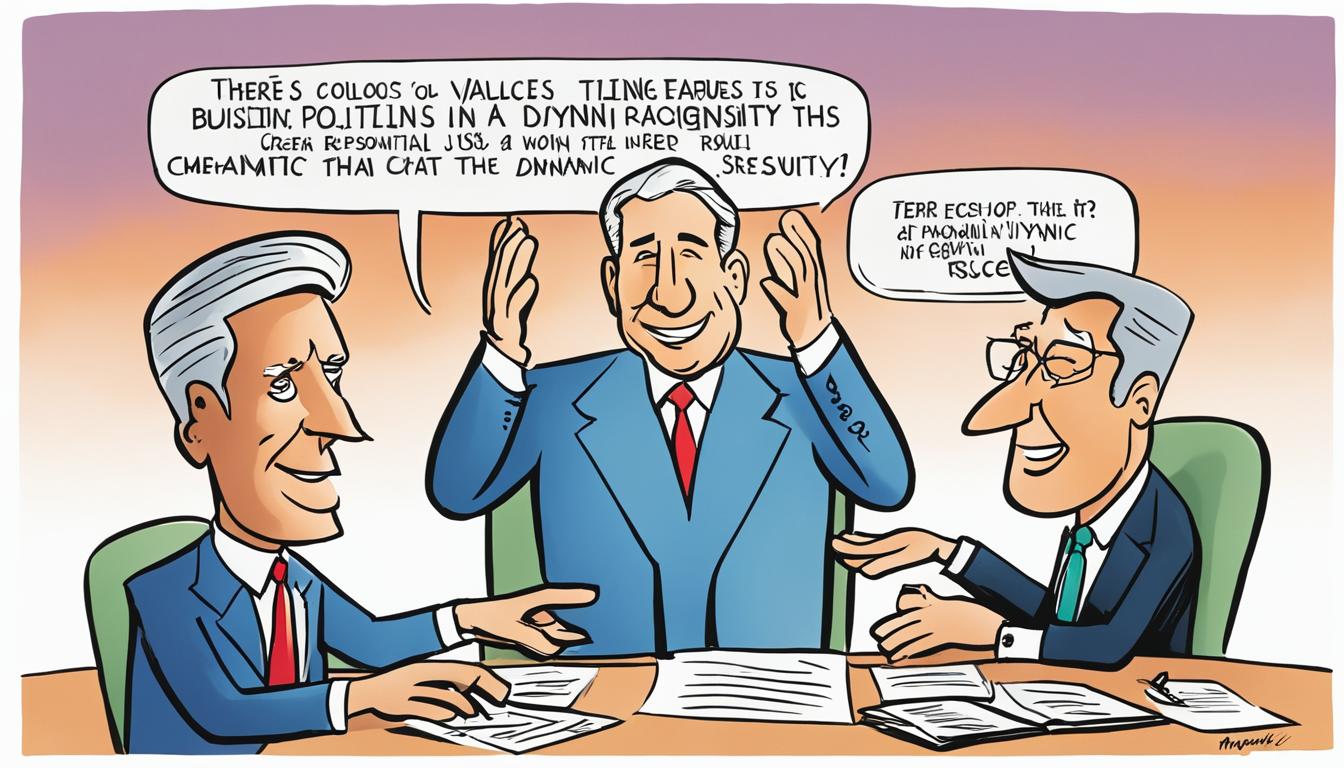John C. Maxwell’s book, “There’s No Such Thing as “Business” Ethics,” provides unique insights and practical advice on ethical behavior in the business world and beyond. Maxwell’s perspective challenges conventional wisdom regarding the separation between personal values and professional conduct. His book inspires readers to integrate ethical behavior into all aspects of life.
Throughout this article, we will delve into Maxwell’s key concepts and explore his ideas on ethical behavior in business practices. We will analyze how to apply his practical advice and overcome ethical dilemmas in the corporate environment. Lastly, we will discuss his thoughts on building an ethical and sustainable organizational culture.
Key Takeaways:
- Maxwell challenges the idea that ethical behavior should only apply to personal life, but not in the business world.
- The book emphasizes the importance of ethical behavior grounded in integrity.
- Maxwell provides practical advice on applying ethical behavior in the context of business operations.
- The book presents approaches to navigate ethical dilemmas in the corporate environment.
- The author addresses the vital role of leadership in creating a culture of ethical behavior.
Introduction to “There’s No Such Thing as “Business” Ethics”
John C. Maxwell’s novel, “There’s No Such Thing as “Business” Ethics,” explores the notion that ethical behavior should be consistent across all aspects of life, including in the business world. This book provides valuable insights into the importance of integrity and ethics in business practices.
In this section, we will introduce the book and its core concepts, summarizing Maxwell’s argument for a single standard of ethical behavior that should be upheld in both personal and professional settings. Through this analysis, readers will gain a deeper understanding of the importance of ethical practices and their role in creating a sustainable and ethical business culture.
The Concept of Ethical Behavior
Maxwell’s book is centered around the idea that ethical behavior should be consistent across all aspects of life. The author challenges the notion of a separate set of ethical standards for businesses. Rather, he argues that the same ethical principles that govern our personal lives must also be applied in the business world.
This key concept sets the foundation for the remainder of the book, as Maxwell explores the practical implications of consistent ethical behavior across various domains, including the role of integrity in business ethics, strategies for applying ethical behavior in business practices, and overcoming ethical dilemmas in the workplace, among others.
The Single Standard for Ethical Behavior
In “There’s No Such Thing as “Business” Ethics,” John C. Maxwell argues for a single standard of ethical behavior that should be upheld in all aspects of life, including business. He believes that ethical behavior in personal and professional settings should not be distinct from one another. Maxwell emphasizes that individuals should possess a strong moral compass, and that their actions and decisions should always reflect their values, regardless of the circumstances.
This idea of a single standard of ethical behavior is particularly relevant in the business world, where individuals may face ethical challenges and dilemmas. According to Maxwell, businesses should prioritize integrity, fairness, and honesty in all their operations to gain the trust of their stakeholders and ensure sustainable success.
Maxwell’s view aligns with the belief that ethical business practices generate long-term value for organizations, employees, customers, and society as a whole. By maintaining a consistent standard of ethical behavior across all settings, individuals can build their reputation, establish trust, and enhance their personal and professional growth.
The Role of Integrity in Business Ethics
According to John C. Maxwell’s book, “There’s No Such Thing as ‘Business’ Ethics,” integrity is a crucial component of ethical behavior in the business world. Maxwell emphasizes that integrity must be a core value in decision-making processes, both in personal and professional settings.
Integrity can be defined as the adherence to moral and ethical principles based on honesty and truthfulness. It involves doing the right thing, even when no one is watching. In the context of business ethics, integrity means being honest and transparent in all business dealings, whether with clients, suppliers, or colleagues.
To illustrate the importance of integrity, Maxwell provides several examples of companies that have suffered reputational damage due to ethical violations. One such example is Enron, which was revealed to have engaged in accounting fraud, among other unethical practices, leading to its eventual bankruptcy.
In contrast, companies that prioritize integrity often reap the benefits of a positive reputation, which can be a valuable asset in attracting new clients and retaining existing ones. Additionally, employees who work for companies that prioritize integrity are often more engaged and committed, leading to higher levels of job satisfaction and productivity.
The Impact of Integrity on Business Practices
Integrity impacts various aspects of business practices, from decision-making to company culture. At its core, integrity means doing the right thing, even when it may be challenging or unpopular. This applies to business decisions as well, where integrity may require making choices that are not necessarily the most profitable but are ethical and moral.
In addition to decision-making, integrity plays a crucial role in establishing a positive company culture. It sends a message that honesty and ethical behavior are valued and expected, setting the tone for employees to do the same. This can lead to a more engaged and productive workforce, as well as increased respect and loyalty from customers and other stakeholders.
Overall, the role of integrity in business ethics cannot be overstated. It is a crucial component of ethical behavior that impacts decision-making, company culture, and reputation. By prioritizing integrity, companies can establish themselves as leaders in their industries and attract loyal and committed employees and customers.
Applying Ethical Behavior in Business
In “There’s No Such Thing as “Business” Ethics” by John C. Maxwell, the author provides practical guidance on how to apply ethical behavior in the context of business operations. One essential strategy he suggests is to include ethical considerations when making decisions that may affect the stakeholders involved. For instance, before implementing a new policy, Maxwell recommends assessing the potential impact on employees, customers, investors, and the community.
Another approach to promoting ethical behavior is to establish a code of conduct. This code should outline expectations for ethical behavior, define specific rules, and lay out the consequences for noncompliance. Companies that implement comprehensive codes of conduct and train their employees on ethical standards can create a culture that values integrity and ethical behavior.

Moreover, it’s crucial for leaders to model ethical behavior and hold everyone accountable for their actions. Maxwell emphasizes that leaders and managers must demonstrate and promote ethical values to inspire their team members to uphold them as well. By fostering a culture of transparency, honesty, and respect, businesses can develop lasting relationships built on trust and ethical values.
Overcoming Ethical Dilemmas in Business
Maxwell presents practical advice on dealing with ethical dilemmas that organizations may encounter. He argues that responsible leaders must always prioritize ethics, even in tough business decisions. “When the right thing and the hard thing are the same, leaders-yet-come exercise integrity.”
The Three Questions
To help resolve ethical dilemmas, Maxwell recommends asking three questions:
- Is it legal?
- Is it balanced?
- How will it make me and others feel?
The first question refers to whether the action is allowed by law, while the second one asks if the decision is unbiased for all parties involved. Lastly, the last question encourages decision-makers to consider the potential consequences of the action and its impact on oneself and others.
Decision-Making Framework
Maxwell outlines a decision-making framework that organizations can use to overcome ethical dilemmas:
| Step | Process |
|---|---|
| 1 | Identify the ethical issue. |
| 2 | Gather the relevant information. |
| 3 | Consult with your colleagues and stakeholders. |
| 4 | Consider your options and their impacts. |
| 5 | Choose your course of action. |
| 6 | Monitor and evaluate your decision. |
Maxwell emphasizes that ethical dilemmas are inevitable in the business world, but they can be managed effectively with the right framework and approach. By following his decision-making framework, organizations can ensure that their actions align with ethical behavior and fair business practices.
Building a Culture of Ethical Behavior
In “There’s No Such Thing as “Business” Ethics,” John C. Maxwell emphasizes the importance of fostering a culture of ethical behavior within organizations. He notes that leadership plays a crucial role in creating an environment where ethical values are upheld and prioritized. This includes setting an ethical tone at the top, modeling ethical behavior, and ensuring that everyone in the organization understands the importance of ethical behavior.
A key aspect of building a culture of ethical behavior is establishing clear ethical standards and expectations. Maxwell notes that these standards should be communicated clearly and consistently throughout the organization, so everyone understands what is expected of them.
One effective way to reinforce ethical behavior is to celebrate positive examples of ethical behavior and correct negative behavior promptly. Leading by example is also crucial – if leaders prioritize ethical behavior, others in the organization are more likely to do the same.
Ultimately, Maxwell argues that organizations with a strong culture of ethical behavior benefit in numerous ways, including better employee morale and retention, stronger relationships with customers and other stakeholders, and a better reputation within the community.
Extending Ethical Behavior Beyond Business
In his book, “There’s No Such Thing as ‘Business’ Ethics,” John C. Maxwell argues that ethical behavior should not be exclusive to the business realm. Maxwell believes that ethics should be integrated into every aspect of life, including personal relationships, community involvement, and beyond.
Maxwell emphasizes the importance of having a single standard for ethical behavior, regardless of the context. This means that individuals should uphold the same level of integrity and moral values in all situations and interactions.
“Integrity is not based on convenience or circumstances. It’s a choice that we make every day, in every decision we make, regardless of the situation around us.”
To extend ethical behavior beyond business, Maxwell suggests individuals adopt a values-based approach to decision-making. This involves identifying and prioritizing personal values, which can guide ethical behavior and decision-making in all areas of life.
By extending ethical behavior beyond business, individuals can build stronger relationships, contribute meaningfully to their communities, and lead more fulfilling lives.
Conclusion:
Maxwell’s book, “There’s No Such Thing as “Business” Ethics,” provides a compelling argument for the integration of ethical behavior into all aspects of life, including business. His belief in a single standard for ethical behavior highlights the importance of integrity in decision-making processes. Additionally, his practical advice on applying ethical behavior in business operations and navigating ethical dilemmas is invaluable.
Maxwell’s ideas on creating a culture of ethical behavior within organizations and extending ethical behavior beyond business settings are key takeaways from the book. It is clear that ethics cannot be compartmentalized into specific arenas, but rather should be a guiding principle in all aspects of life.
In conclusion, “There’s No Such Thing as “Business” Ethics” is a must-read for anyone looking to integrate ethical behavior into their personal and professional life. Maxwell’s insights are timely and essential in a world where ethics are often an afterthought.



